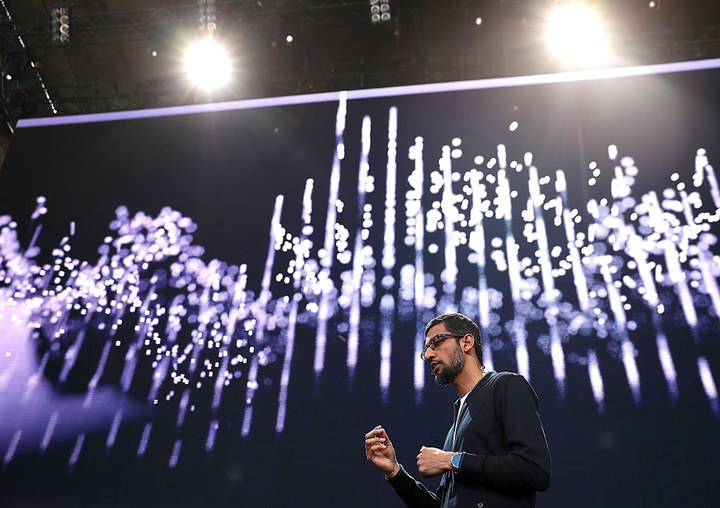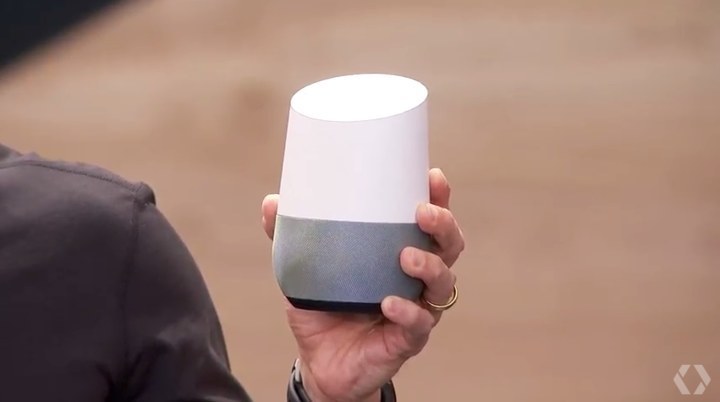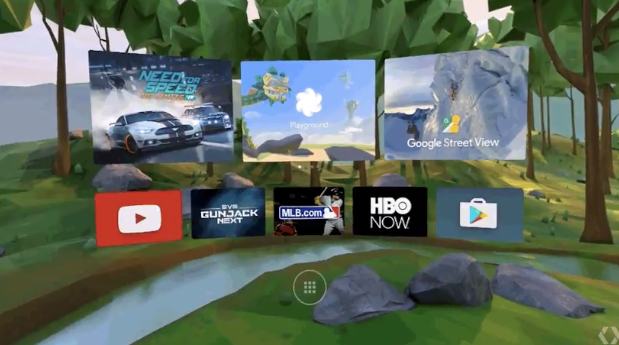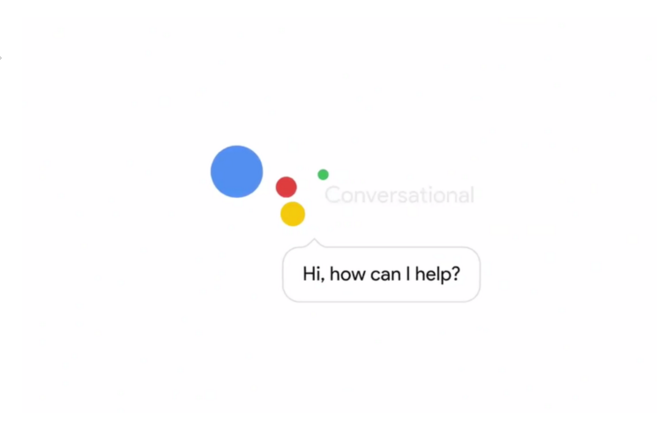
Justin Sullivan / Getty Images
Today, Google convened 7,000 developers and journalists at a popular outdoor concert venue in Silicon Valley and gave a two-hour state of the union on the future of arguably the most powerful and ambitious company in the world. In front of a packed crowd and tens of thousands watching via live stream, the company brought its best and brightest minds on stage and unveiled to the world that Google is playing catch-up with a slew of products and services we’ve already seen before from other companies.
There’s Google Assistant, a conversational AI chat and search bot (Facebook’s M/Microsoft’s bot projects/Apple’s Siri/Viv/literally everyone has a bot these days); Google Home, a voice-powered home entertainment and task hub (Amazon’s dreadfully popular and beloved Echo); Allo and Duo, two mobile messaging and mobile video apps (Facebook’s Messenger goliath with nearly 1 billion users); and Daydream, Google’s Android-powered virtual reality platform, headset, and multimedia content hub (Oculus).
That’s a lot of familiar innovation! But make no mistake, Google, led by its fresh-faced, immaculately tailored blue jacket–wearing CEO, Sundar Pichai, didn’t tiptoe around the stage today. Quite the opposite, Google’s 2016 I/O keynote address was confident, enthusiastic, and more than just a little impressive. The message: Sure, you’ve seen it all before, but not like this.
Google I/O — now over a decade old — is a stage where executives parachute out of planes to demo new hardware, where virtual reality is delivered in simple cardboard boxes. It's an event at which Google often reveals its loftiest projects, like bringing wireless internet and smartphones to the developing world with the help of — among other things — huge balloons. This year, though, when Apple and Facebook have devoted large chunks of their keynotes to selling themselves as benevolent world leaders, Google struck a different, far more practical tone.

Google Home.
Via Google
With Google Assistant, for example, Pichai said the company is aiming to build each user “their own individual Google.” He described Assistant as an “ambient” experience that will become “the context of our daily lives." That's a good way to understand what Google showed us today. Allo and Duo are deeply intuitive and contextually intelligent bits of software designed to make communication with friends, family, and co-workers easier and more personable. Daydream is, first and foremost, an immersive entertainment experience, centered around a reimagined 360-degree YouTube and app store for games and other content nuggets from places like the New York Times, CNN, Netflix, and the NBA. It’s VR for the phone but also the family room. Home, while it looks and is like Echo, is a connected home hub: a smart layer of connective Google tissue that extends the Google digital ecosystem into your physical world — perhaps the logical conclusion in a "Google as the context of your daily life" five-year plan.
Still, on the surface, this is not what we'd call world-changing innovation. But it might be life-changing in the "daily life" sense of the word — if you're a middle- to upper-class consumer in the developed world.

A look at Google's VR platform, Daydream.
Via Google
Looked at one way, today’s I/O keynote was both a tacit admission and a reminder of Google's technological and data dominance. A few really cool nuggets (Android Instant Apps) aside, Google’s reveals suggest that the company has clearly fallen a bit behind in a number of key categories, like social, messaging (remember when every single human used Gchat?!), practical assistive AI, in-home, and non-cardboard-box-based virtual reality. Recall that at Facebook’s developers conference last month, CEO Mark Zuckerberg showed off a suite of already launched products and services that were comprehensive and fully realized enough that he felt emboldened to share the company’s 10-year plan (however vague).
By contrast, Pichai and Google today showed us things we've already seen, albeit things now Google-powered. And most of what was unveiled won’t be available for weeks, if not months. Last year, I watched, mouth slightly agape, from a seat in San Francisco’s Moscone Center as the search behemoth unveiled Google Now on Tap’s contextual search — it was a showstopper. Fifty-two weeks later, Google executives trotted out the same features with similar levels of exuberance as if to say, "OK, yeah, this is really happening now!"
But Google didn’t seem to care, and for good reason. Because to dismiss today's I/O keynote as too practical or too boring is to dismiss a company that arguably has more access to more deeply personal information than any entity on the planet. In this sense, Google’s catch-up cycle is undergirded by a much bigger truth: Every product and service that Google cribbed from or cloned today is made or broken by the company's ability to evolve and improve them by harvesting and analyzing our data. And few companies have more experience harvesting the data of their users than Google.
With huge audiences and hordes of hyper-scrutinizing media outlets on hand, big tech’s keynotes are meticulously planned, tightly scripted affairs. And Google is no exception, which is probably why the company saved its most important monologue for last.

Google Assistant.
Via Google
As the midday temperature climbed inside the amphitheater, Pichai returned to the stage to deliver a reminder of sorts in the form of a story about a move by Google’s DeepMind AI program AlphaGo in the second game of a March tournament in South Korea. At move 37, AlphaGo executed an unfathomable, unprecedented move in the complex game and beat one of the world’s best players in a truly unexpected fashion. “It wasn’t just an intuitive move, but a very creative one,” Pichai told the crowd in a hushed voice as he paced the stage. “We normally don’t associate computers with making creative choices, so to us this represents a significant achievement in AI.” Pichai concluded with trademarked optimism: “Things previously thought to be impossible may, in fact, be possible," he said.
Pichai went on to suggest the possibility of similar breakthroughs in climate change, education, robotics, and health care, but his point served as a direct and final reminder of Google's real prowess. While it might trail Amazon in manufacturing little voice-activated AI pods, Google has been hard at work gobbling up information for about 17 years. And, more recently, it’s been directing significant resources toward the development of deep neural networks and machine learning technologies (you may have dozed off during the part of the keynote where Google revealed that the data centers supporting a lot of its machine learning applications are running Google-designed chips that basically fast-forward their performance about seven years into the future; that's another example of just how far ahead the company really is).
In this light, Pichai’s closing anecdote was sort of like the world’s most subtle mic drop. Read between the lines and it might look a bit like this: Our machine learning is so good, it's GODLIKE. We have essentially engineered CREATIVITY in machines!
Among the big tech companies, this kind of hubris is borderline ridiculous — again, a lot of what Google showed us today isn't yet available — but somehow the future Google is describing with it is believable. So, yes, Google is playing catch-up, and no, Google doesn’t care — not when things previously thought to be impossible may, in fact, be possible.
from BuzzFeed - Tech https://www.buzzfeed.com/charliewarzel/when-it-comes-to-the-future-google-doesnt-need-to-be-first?utm_term=4ldqpia
No comments:
Post a Comment